The Act on Promoting Transitional Justice (促進轉型正義條例), which aims to remove authoritarian-era symbols and retry cases of injustice from that era, was passed by the Legislative Yuan yesterday evening.
The act is aimed at addressing injustices perpetrated by then-Chinese Nationalist Party (KMT) government between Aug. 15, 1945, when the Japanese government announced it had surrendered, to Nov. 6, 1992, when the Period of National Mobilization against Communist Rebellion ended in Kinmen and Lienchiang counties.
A nine-member Transitional Justice Promotion Committee is to be created, to be overseen by the Executive Yuan, with its chairman nominated by the premier and approved by at least half of the members of the Legislative Yuan.

Photo: CNA
The committee is also to address and utilize ill-gotten political party assets, but its purview will not include items already covered by the Act Governing the Handling of Ill-gotten Properties by Political Parties and Their Affiliate Organizations (政黨及其附隨組織不當取得財產處理).
The new act states that data unconstitutionally seized during the authoritarian era are to be collated and archived and made available for research and educational purposes as long as people mentioned in the data have their privacy and their freedom of communication protected.
Authoritarian symbols commemorating dictators that are publicly displayed are to be removed, renamed or addressed by other means as a way of upholding the nation’s free and democratic constitutional system.

Photo: Huang Yao-cheng, Taipei Times
Criminal cases found to have been unjustly adjudicated on are to be reinvestigated by the committee, with defendants granted retrial. People found responsible for mistrials are to be held accountable and required to compensate defendants and their family members as well as to take measures to restore their reputations.
Political parties, their affiliates and organizations they operate are to report to the committee any political files in their possession which, if necessary, are to be transferred to the government and archived.
Those that fail to do so could be fined between NT$1 million and NT$5 million (US$33,341 and US$166,705) and could be subject to repeated fines.
People found guilty of disposing of, sabotaging or concealing political data owned by political parties or their affiliated organizations could face prison sentences of up to five years.
People who object to rulings by the committee would have one month to request a reinvestigation and two months to initiate an administrative lawsuit.
Chinese Nationalist Party (KMT) lawmakers said the Democratic Progressive Party (DPP) has undermined the nation’s political system by creating an agency with administrative, judicial and investigative powers.
The passage of the act heralds the dawning of a new authoritarian era, KMT Legislator Lai Shyh-bao (賴士葆) said.
The act clearly targets the KMT and overlooks atrocities perpetrated by the Japanese colonial government, he said.
“When the KMT regains political power, we will also propose a transitional justice bill targeting [President] Tsai’s [Ing-wen, 蔡英文] authoritarian rule,” he said.
Non-Partisan Solidarity Union Legislator May Chin (高金素梅) and New Power Party Legislator Kawlo Iyun Pacidal panned the act for not requiring the government to relinquish Aboriginal lands once held by the Japanese colonial government.
However, DPP Legislator Wang Ding-yu (王定宇) said the act “opened a new frontier” for victims of the authoritarian era, as the government can now legally investigate data from that period, seek out and punish perpetrators of injustice as well as compensate the era’s victims and restore their dignity.
This story has been updated since it was first published.

ENDEAVOR MANTA: The ship is programmed to automatically return to its designated home port and would self-destruct if seized by another party The Endeavor Manta, Taiwan’s first military-specification uncrewed surface vehicle (USV) tailor-made to operate in the Taiwan Strait in a bid to bolster the nation’s asymmetric combat capabilities made its first appearance at Kaohsiung’s Singda Harbor yesterday. Taking inspiration from Ukraine’s navy, which is using USVs to force Russia’s Black Sea fleet to take shelter within its own ports, CSBC Taiwan (台灣國際造船) established a research and development unit on USVs last year, CSBC chairman Huang Cheng-hung (黃正弘) said. With the exception of the satellite guidance system and the outboard motors — which were purchased from foreign companies that were not affiliated with Chinese-funded

PERMIT REVOKED: The influencer at a news conference said the National Immigration Agency was infringing on human rights and persecuting Chinese spouses Chinese influencer “Yaya in Taiwan” (亞亞在台灣) yesterday evening voluntarily left Taiwan, despite saying yesterday morning that she had “no intention” of leaving after her residence permit was revoked over her comments on Taiwan being “unified” with China by military force. The Ministry of the Interior yesterday had said that it could forcibly deport the influencer at midnight, but was considering taking a more flexible approach and beginning procedures this morning. The influencer, whose given name is Liu Zhenya (劉振亞), departed on a 8:45pm flight from Taipei International Airport (Songshan airport) to Fuzhou, China. Liu held a news conference at the airport at 7pm,

Taiwan was ranked the fourth-safest country in the world with a score of 82.9, trailing only Andorra, the United Arab Emirates and Qatar in Numbeo’s Safety Index by Country report. Taiwan’s score improved by 0.1 points compared with last year’s mid-year report, which had Taiwan fourth with a score of 82.8. However, both scores were lower than in last year’s first review, when Taiwan scored 83.3, and are a long way from when Taiwan was named the second-safest country in the world in 2021, scoring 84.8. Taiwan ranked higher than Singapore in ninth with a score of 77.4 and Japan in 10th with

GRIDLOCK: The National Fire Agency’s Special Search and Rescue team is on standby to travel to the countries to help out with the rescue effort A powerful earthquake rocked Myanmar and neighboring Thailand yesterday, killing at least three people in Bangkok and burying dozens when a high-rise building under construction collapsed. Footage shared on social media from Myanmar’s second-largest city showed widespread destruction, raising fears that many were trapped under the rubble or killed. The magnitude 7.7 earthquake, with an epicenter near Mandalay in Myanmar, struck at midday and was followed by a strong magnitude 6.4 aftershock. The extent of death, injury and destruction — especially in Myanmar, which is embroiled in a civil war and where information is tightly controlled at the best of times —